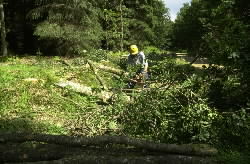 In many ways managing smaller areas makes woodland management easier. The complex tariffing and development of site specific silvicultural systems is not strictly necessary when dealing with smaller areas, and individual trees can be selected for felling as required. When dealing with very small volumes, you may not even need to apply for a felling licence to get work carried out (though do check here)
In many ways managing smaller areas makes woodland management easier. The complex tariffing and development of site specific silvicultural systems is not strictly necessary when dealing with smaller areas, and individual trees can be selected for felling as required. When dealing with very small volumes, you may not even need to apply for a felling licence to get work carried out (though do check here)
NB This is not the same as doing without a management plan altogether. Some records of work that has been carried out, woodland area, constraints and plans should always be kept. If nothing else, this allows the management of a woodland to be documented allowing you to make coherent decisions over a significant length of time.
Carrying out work on a smaller scale can lead to difficulties. Economies of scale will not apply, so any planting or infrastructure costs are likely to be high.
A number of organisations offer support to owners of small woodlands particularly the Forestry Commission and the Small Woods Association. The SWA also maintains an information and advice page, and a list of woodland initiatives and projects many of whom are able to deliver specialist support.